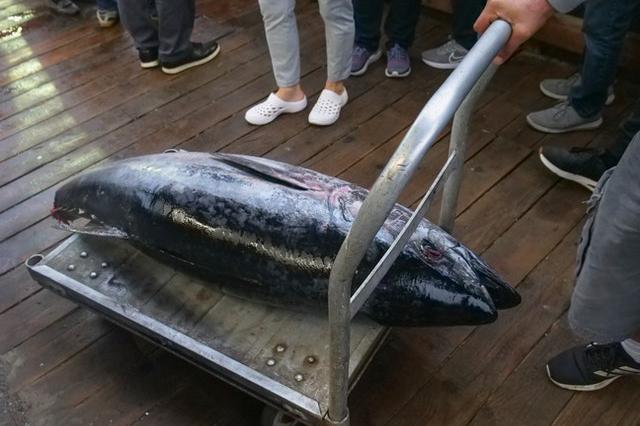
The bluefin tuna is one of the world’s most endangered fish. Weighing up to 1000 pounds, the fish are majestic, sport incredible torpedo shaped bodies, and socialize in enormous schools--which also makes them vulnerable to large-scale fishing operations.
The evidence suggests that bluefin stocks around the globe have fallen sharply the past 40 years. Tuna of any species is prized by restauranteurs and commercial fishing companies--so much so in fact that environmental groups have called for a total ban on bluefin tuna fishing so that their stocks can recover. Just one female bluefin tuna can produce 20 to 30 million eggs at her peak maturity.
So to eat or not eat bluefin tuna? As with any fish, consumers should consider deferring to the Monterey Bay Aquarium’s Seafood Watch guide: a quick search suggests that shoppers avoid either farmed or wild-caught bluefin tuna.
The U.S. National Oceanic and Atmospheric Administration (NOAA), however, recently refused to grant the Atlantic bluefin tuna “endangered” status.
Politics, not science, are behind that decision, as several senators have made it clear through their actions that they do not want to face unhappy fisherman with another election year on the horizon. Forget semantics and read what NOAA has to say--it should give you pause no matter what a government-imposed status may infer.
So what are the choices? Aquaculture is one option, but the long term efficacy and sustainability of farming tuna are still unknown. Fish farming may have a role in the decline of overfished species in Australia, but the record of salmon and tilapia farms around the world score dubious results. Clean Seas, an Australian fish farming company, believes it is a couple years away from finding commercial success with farming bluefin tuna. Many advocates of sustainable fishing cry foul at companies taking fish out of the wild and have them breed in fish farms. One argument is that juvenile tuna should be given the chance to mature in the wild--but currently no commercial method for breeding Atlantic bluefin tuna exists.
When it comes to the Atlantic bluefin tuna, one company, Umami Sustainable Seafood, believes it has a solution. The San Diego-based company argues that its cultivation of the Atlantic bluefin is a more sustainable option for sustainable fishing than what is occurring out in the wild, especially when accounting for the overfishing in the Mediterranean and Atlantic.
Whatever your take is, fish farming may well be the way of the future. Purists and environmentalists may despise the idea, but if overfishing is not curtailed, farmed fish may be the way of the future. And if aquaculture techniques for breeding bluefin tuna can be perfected by companies like Clean Seas--and then successfully applied to the Atlantic bluefin--therein lies an argument that we may be giving the Atlantic bluefin tuna more of a chance.
Like many sustainability choices, there is no clear answer. The Monterey Bay Seafood Watch is the most respected arbiter of what seafood to eat and avoid. Regardless, the savvy investor may want to purchase some Umami Sustainable Seafood stock. One trend is clear--with the demand for bluefin tuna hardly abating, this will be a stock to add to your portfolio.
Image credit: Kindel Media via Pexels

Leon Kaye has written for 3p since 2010 and become executive editor in 2018. His previous work includes writing for the Guardian as well as other online and print publications. In addition, he's worked in sales executive roles within technology and financial research companies, as well as for a public relations firm, for which he consulted with one of the globe’s leading sustainability initiatives. Currently living in Central California, he’s traveled to 70-plus countries and has lived and worked in South Korea, the United Arab Emirates and Uruguay.
Leon’s an alum of Fresno State, the University of Maryland, Baltimore County and the University of Southern California's Marshall Business School. He enjoys traveling abroad as well as exploring California’s Central Coast and the Sierra Nevadas.














